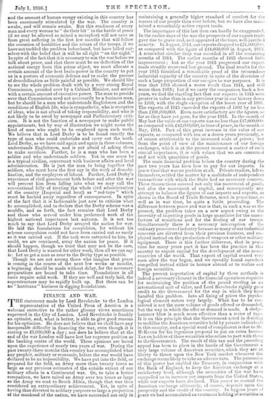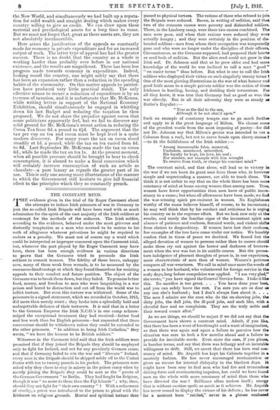FINANCE AND WAR. T HE statement made by Lord Revelstoke to
the London representative of the United Press of America is a welcome corrective to the rather gloomy views sometimes expressed in the City of London. Lord Revelstoke is frankly an optimist, and, what is better, is able to give good reasons for his optimism. He does not believe that we shall have any insuperable difficulty in financing the war, even though it is costing us £5,000,000 a day ; nor does he believe that at the end of the war London will have lost her supreme position as the banking centre of the world. These opinions are based upon the experience of nearly two years of war. During the past twenty-three months this country has accomplished what any prophet, military or economic, before the war would have declared to be an impossibility. We have put into the field, or prepared for the field, an Army more than twenty times as large as our previous estimates of the outside extent of our military efforts in a Continental war. Or, to take a better comparison, we have raised an Army over ten times as large as the Army we sent to South Africa, though that was then considered an extraordinary achievement. Yet, in spite of having thus diverted to military purposes so large a proportion of the manhood of the nation, we have succeeded not only in maintaining a generally higher standard of comfort for the masses of our people than ever before, but we have also main- tained a remarkably active export trade.
The importance of this last item can hardly be exaggerated. In the earlier days of the war the prospects of our export trade gave rise to grave and, as it appeared at the time, well-justified anxiety. In August, 1914, our exports dropped to £24,000,000, as compared with the figure of £44,000,000 in August, 1913.
A somewhat similar drop was recorded in all the remaining months of 1914. The earlier months of 1915 showed little improvement; but as the year 1915 progressed our export trade steadily recovered lost ground. The final results for the year 1915 furnished a remarkable proof of the tremendous industrial capacity of the country in spite of the diversion of such a large proportion of our energies to war purposes. It is true that 1915 showed a worse result than 1914, and still worse than 1913; but if we carry the comparison back a few years, we find the startling fact that our exports in 1915 were greater in value than in any previous year in our history down to 1910, with the single exception of the boom year of 1907. The exports of 1915 exceeded the exports of 1902 by no less than £101,000,000. Even more satisfactory are the figures, so far as they have yet gone, for the year 1916. In the month of May last the value of our exports was no less than £47,000,000.
as compared with £42,000,000, in time of peace, in the month oi May, 1914. Part of this great increase in the value of our exports, as compared with ten or a dozen years previously, of course attributable to the increased scale of prices ; but from the point of view of the maintenance of our foreign exchanges, which is at the present moment a matter of such crucial importance, it is with values that we are concerned and not with quantities of goods. The main financial problem before the country during the past two years has been bow to pay for our Imports. In peace time that was no problem at all. Private traders, left to themselves, settled the matter by a multitude of independent transactions with which the State had no necessary concern.
These transactions covered not only the movement of goods, but also the movement of capital, and consequently any attempt to balance the figures of our imports and exports, as shown in the Board of Trade Returns, must in peace time, as well as in war time, be quite a futile proceeding. The difference between peace and war is that, in such a war as the present, the problem takes on a new aspect owing to the necessity of importing goods in largo quantities for the manu- facture of munitions and for the feeding of our troops.
Simultaneously there is a necessary interruption of the ordinary processes of industry because so many of our industrial concerns are diverted from their previous business, and em- ployed instead on the production of weapons or other military equipment. There is this further difference, that in peace time for many years past it has been the practice in this country to export capital for the development of the newer countries of the world. That export of capital ceased very soon after the war began, and we speedily found ourselves compelled instead either to borrow abroad or to realize our foreign securities. The present importation of capital by these methods is indeed a necessary element in the financial operations requisite for maintaining the position of the pound sterling as an international unit of value, and Lord Revelstoke rightly gave credit to the Government for the way in which they have handled this problem. Into all fixing of prices the psycho- logical element enters very largely. What has to be con- sidered is not the mere volume of goods offered or demanded, but the way in which the offer or demand is made. A sledge- hammer blow is much more effective than a. series of taps. It is on this principle that the Government acted in deciding to mobilize the American securities held by private individuals in this country, and a special word of compliment is due to Mr. McKenna for his ingenious proposal to put an extra Income Tax on holders of those securities who refuse to part with them to the Government. The result of this tax and the preceding appeal has been to place in the hands of the Government a very large volume of American securities, which they are at liberty to throw upon the New York market whenever the exchange seems likely to take an adverse turn. The possession of this power has enabled the Treasury, in conjunction with the Bank of England, to keep the American exchange at a satisfactory level, although the necessities of the war have compelled us to increase our imports from the United States, while our exports have declined. This power to control the American exchange ultimately, of course, depends upon the prosperity and the credit of the country. In bygone years of peace we had accumulated an enormous holding of securities la the New World, and simultaneously we had built up a reputa- tion for solid wealth and straight dealing which makes every country willing to give us credit. We can draw upon these material and psychological assets for a long time to come. But we must not forget that, great as these assets are, they are not absolutely inexhaustible.
Here arises the justification of the appeals so constantly made for economy in private expenditure and for an increased output of work. The latter type of appeal has had the greater success. There is no doubt that the country as a whole is working harder than probably ever before in our national existence, and the results are magnificent. There has been less progress made towards economy in expenditure. Indeed, looking rouna the country, one might safely say that there has been an expansion rather than a reduction in the spending habits of the community. On this matter appeals to patriot- ism have produced very little practical result. The only effective means to secure a reduction of expenditure is by an increase of taxation, and it is unfortunate that Mr. McKenna, while writing letters in support of the National Economy Exhibition, should simultaneously be engaged in whittling down his last Budget and reducing the taxation he then proposed. We do not share the prejudice against cocoa that some politicians apparently feel, but we fail to discover any solid ground for Mr. McKenna's recent action in reducing the Cocoa Tax from 6d. a pound to 44d. The argument that the tax per cup on tea and cocoa must be kept level is a quite modern discovery. For many years the tax on cocoa stood steadily at Id. a pound, while the tax on tea varied from 4d. to 8d. Last September Mr. McKenna made the tax on cocoa 6d., while he made the tax on tea is. At the present moment, when all possible pressure should be brought to bear to check consumption, it is absurd to make a fiscal concession which will certainly increase consumption of such an article as chocolate—a pure luxury as regards the greater part of its use. This is only one among many illustrations of the manner in which the Government still hesitate to give full financial effect to the principles which they so constantly preach.











































 Previous page
Previous page